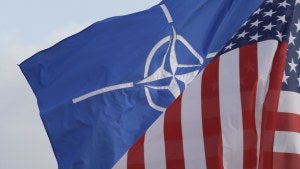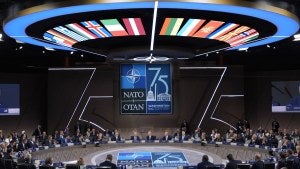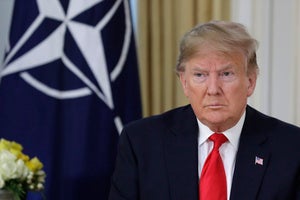The gap between Democrats and Republicans on America's NATO commitment has reached an all-time high in Council polling dating back to 1974.
As the NATO summit approaches on June 24–25, 2025, European and Canadian leaders are being pressured by US President Donald Trump and, more recently, NATO Secretary General Mark Rutte, to spend at least 5 percent of gross domestic product (GDP) on defense to boost their contributions to the alliance. At this point, the bulk of the 32 alliance members have met the 2023 agreement that member countries spend at least 2 percent of GDP on national defense budgets, and they seem to be nearing agreement to approve the higher levels this year. According to Rutte, this increase is important because, “We all benefit from the protection our transatlantic alliance provides. And it is vital that every member of NATO pulls their weight. Because America has carried too much of the burden for too long.”
While Americans would likely welcome increased burden sharing from allies, Chicago Council on Global Affairs polling over the past 50 years has found consistent support for NATO. A more recent joint Chicago Council-Ipsos poll, fielded May 30–June 1, 2025, finds Americans widely acknowledge the benefits US alliances bring to the United States and its allies. On NATO specifically, bipartisan majorities continue to support the alliance, though there is a considerable enthusiasm gap between Democrats and Republicans.
Key Findings
- A solid majority of Americans think US alliances are beneficial to the United States and its allies (61%, up from 51% in 2024) or mostly benefit the United States alone (11% compared to 13% in 2024).
- Three in four (74%) favor maintaining or increasing the US commitment to NATO. While majorities across political affiliations express support, the difference between Democrats (91%) and Republicans (59%) on the question has reached an all-time high in Council polling dating back to 1974.
- Nearly six in 10 overall say NATO makes the United States safer (57%) compared to just 8 percent who say less safe (33% say it makes no difference).
- Republican hesitation toward alliances could be linked to perceptions of limited freedom to maneuver. Only 38 percent of Republicans believe the United States should make international decisions collectively with its allies if this means Washington might have to compromise. A majority of the overall public, however, agrees with this tradeoff (60%).
Increased Majorities Say Alliances Are Beneficial to the United States
June is an “ally-filled” month for President Trump. He recently met with new German Chancellor Friedrich Merz, attended the G7 summit at a Canadian ski resort, and is scheduled to attend the NATO summit in the Netherlands in close succession. The dialogues come as the Trump administration has imposed tariffs on many friendly countries and as Trump himself continues to make efforts to build ties with the Kremlin—resulting in new strains for transatlantic relations.
For their part, everyday Americans believe US alliances are beneficial not just to allies but also to the United States. Of the overall public, seven in 10 combined (72%) think security alliances benefit the United States and allies (61%) or mostly benefit the United States (11%). This majority represents an increase over the past year, when 64 percent perceived mutual or US benefit. Additionally, the sense that alliances are beneficial has increased across all partisan groupings. Eight in 10 Democrats (83%, up from 74% in 2024), seven in 10 Independents (69%, up from 62%) and six in 10 Republicans (63%, up from 55%) believe alliances provide mutual benefits or mostly benefit the United States).
Bipartisan Majorities Support Continuing Commitment to NATO
While alliances in general are now viewed as even more beneficial than before, Trump’s skepticism about NATO may have influenced GOP attitudes toward that alliance specifically.
Overall, a combined three in four Americans (74%) favor maintaining (48%) or increasing (25%) US support for NATO, similar to readings going back to 2002. As has been true in Council polls since 1998, Democrats appear to be the most enthusiastic backers of the NATO alliance, with nine in 10 supporting maintaining or increasing the US commitment (91%). Seven in 10 Independents (70%) feel the same way, similar to their views over the past two decades.
While a majority of Republicans also endorse the US commitment to NATO (59%), this share has dropped 9 percentage points since last year to its lowest level yet on record for Chicago Council surveys. The combination of declining Republican support and growing Democratic support has led to an ever-widening partisan gap on America’s NATO commitment, which today stands at a record 32 percentage points.
This is not the first hint of softening Republican support for US alliances in Europe. Back in 2023, the Chicago Council Survey found that just half of Republicans (50%) believed US security alliances in Europe benefited the United States and its allies or mostly benefited the United States, down from 54 percent in 2020 and 61 percent in 2019.1 In the same year, Republican support for US military bases in key European countries also dropped.2
NATO Makes United States Safer, According to US Public
Past Council polling has consistently found that “maintaining existing alliances” is seen as a top foreign policy tool (along with maintaining US military superiority). This latest survey provides further evidence to support the idea that NATO contributes to US security. A majority of Americans believe cooperation between North American and European NATO members makes the United States safer (57%, up from 52% in 2024).
On this question, Democrats have grown even more likely to credit NATO cooperation for making the country safer (76%, up from 65% in 2024); Independents (52%) and Republicans (43%) remain stable with previous levels. For their part, fewer Republicans now than in previous polling say transatlantic cooperation makes the United States less safe (8%, down from 18%), resulting in a shift toward a plurality saying it makes no difference in the country’s safety (47%).
Further Drops in Republican Support for Assisting Ukraine
European leaders experienced major whiplash when Trump officials flipped Biden-era policies on Ukraine—at one point Trump even attributed blame to Ukrainian President Volodymyr Zelenskyy rather than Russian President Vladimir Putin for starting the war. For their part, most Americans remain supportive of Ukraine and deem Putin the aggressor, but Republican supporters’ patience for aiding Ukraine seems to be wearing thin.
Of all the questions surrounding European security in Chicago Council polls, perhaps the issue where Republican attitudes really diverge from other Americans is on continued aid to Ukraine. As a March 2025 Chicago Council-Ipsos survey shows, majorities of Americans continue to support providing economic (55%) and military assistance (52%) to Ukraine, but at lower levels now than at the start of the war, or even since a year ago.
As the above chart illustrates, Republican support for continued assistance has plunged to its lowest level yet (just three in 10 support economic and military aid), dragging down overall support. Independent support has remained at roughly the same level over the past year, while Democratic support has increased since the Trump transition.3
Emphasis on US Independent Action a Factor in Republican Attitudes
While six in 10 Americans believe the United States should make international decisions collectively with its allies even if this means the United States might have to compromise (60%), this overall majority belies a huge gulf between Democrats and Independents on the one hand and Republicans on the other. Democrats (79%) and Independents (60%) agree the United States should make decisions with allies even if it means it has to go along with a policy that is not its first choice. Republicans, as they have in the past, beg to differ. Just 38 percent of GOP supporters favor going along with this type of compromise, with 60 percent disagreeing.
Conclusion
The Russian invasion of Ukraine gave a sense of purpose to the NATO alliance, and under the administration of President Joe Biden, the United States took the lead in managing a collective response. Under President Trump’s leadership, the United States has made it clear that it does not intend to be the security partner it has been in the past for Europe and has focused mostly on trying to end the war in Ukraine instead of assisting Kyiv in its self-defense.
The American people, on the other hand, perceive benefits from alliances and want to maintain the US commitment to NATO. But when it comes to assisting Ukraine, US public support has declined, most especially among Republicans. How allies and US officials manage interactions at the upcoming NATO summit on a range of issues could influence the direction the United States aims to steer the alliance. It may also clarify to what extent the United States expects longtime European partners to fend for themselves.
- 1
In the 2023 Chicago Council Survey, respondents were asked about US security alliances in specific regions of the world (Europe, East Asia, and the Middle East); in the most recent Chicago Council-Ipsos survey, they were asked broadly about US security alliances. See appendix for the full question wording.
- 2
The 2023 Council Survey also showed Republican support for US military bases around the world fell sharply, with the greatest declines seen for bases in Poland (from 68% to 53%), Turkey (from 65% to 48%), and in NATO allies like Lativa, Lithuania, or Estonia (from 67% to 45%). These declines could signal a greater Republican focus on China, rather than Russia, as critical threats to US security. Republicans were more likely to say that alliances in East Asia benefit the United States and its allies or mostly benefit the United States (59%, up from 50% in 2020), and that US leaders focused too much on the war in Ukraine (49%) and not enough on US competition with China (60%).
- 3
A 2023 Chicago Council Survey found that a majority of Americans thought the United States and Europe should be equally responsible for helping Ukraine defend itself (66% vs. 30% saying Europe should be more responsible). But this was more divided among Republican Party supporters (52% both equally vs. 46% saying Europe should be more responsible).
This analysis is based on data from a joint Chicago Council on Global Affairs-Ipsos survey. The survey was conducted May 30–June 1, 2025, using Ipsos’ large-scale, nationwide, online research panel, KnowledgePanel, among a weighted national sample of 1,026 adults 18 or older living in all 50 US states and the District of Columbia. The margin of sampling error for the full sample is ±3.2 percentage points, including a design effect of 1.08.
The data for the total sample were weighted to adjust for gender by age, race/ethnicity, education, Census region, metropolitan status, and household income using demographic benchmarks from the 2024 March Supplement of the Current Population Survey (CPS).
Specific categories used were:
- Gender (Male, Female) by Age (18–29, 30–44, 45-59 and 60+)
- Race/Hispanic Ethnicity (White Non-Hispanic, Black Non-Hispanic, Other, Non-Hispanic, Hispanic, 2+ Races, Non-Hispanic)
- Education (Less than High School, High School, Some College, Bachelor or Higher)
- Census Region (Northeast, Midwest, South, West)
- Metropolitan Status (Metro, Non-Metro)
- Household Income (Under $25,000, $25,000–$49,999, $50,000–$74,999, $75,000–$99,999, $100,000–$149,999, $150,000+)
Q33S. Opinions on U.S. Security Alliances
As you may know, the United States has security alliances with countries around the world. Which of the following comes closest to your view about these alliances? Do they:
| Year | Overall | Republican | Democrat | Independent | R-D Gap |
|---|---|---|---|---|---|
| 2024 | 13 | 10 | 16 | 13 | -6 |
| 2025 | 11 | 11 | 11 | 10 | 0 |
| Year | Overall | Republican | Democrat | Independent | R-D Gap |
|---|---|---|---|---|---|
| 2024 | 28 | 39 | 19 | 26 | 20 |
| 2025 | 19 | 32 | 10 | 17 | 22 |
| Year | Overall | Republican | Democrat | Independent | R-D Gap |
|---|---|---|---|---|---|
| 2024 | 51 | 45 | 58 | 49 | -13 |
| 2025 | 61 | 52 | 72 | 59 | -20 |
| Year | Overall | Republican | Democrat | Independent | R-D Gap |
|---|---|---|---|---|---|
| 2024 | 7 | 4 | 5 | 11 | -1 |
| 2025 | 8 | 4 | 7 | 11 | -3 |
Summary of Q33S – 2025 FP4 data only
| Overall | Republican | Democrat | Independent | R-D Gap | |
|---|---|---|---|---|---|
| Mostly benefit the United States | 11 | 11 | 11 | 10 | 0 |
| Mostly benefit our allies | 19 | 32 | 10 | 17 | 22 |
| Benefit both the US and our allies | 61 | 52 | 72 | 59 | -20 |
| Benefit neither | 8 | 4 | 7 | 11 | -3 |
For comparison: Question 33B
Q33B. Which of the following comes closest to your view on US security alliances in Europe. Do they:
| Overall | Republican | Democrat | Independent | R-D Gap |
|---|---|---|---|---|
| 9 | 7 | 11 | 8 | -4 |
| 6 | 7 | 8 | 4 | -1 |
| 18 | 13 | 24 | 16 | -11 |
| 7 | 4 | 10 | 7 | -6 |
| 7 | 6 | 9 | 6 | -3 |
| Overall | Republican | Democrat | Independent | R-D Gap |
|---|---|---|---|---|
| 26 | 36 | 14 | 31 | 22 |
| 24 | 32 | 12 | 30 | 20 |
| 20 | 29 | 10 | 24 | 19 |
| 21 | 41 | 7 | 20 | 34 |
| 24 | 35 | 12 | 25 | 24 |
| Overall | Republican | Democrat | Independent | R-D Gap |
|---|---|---|---|---|
| 53 | 48 | 64 | 47 | -16 |
| 58 | 54 | 68 | 53 | -14 |
| 52 | 53 | 56 | 49 | -3 |
| 61 | 50 | 71 | 59 | -21 |
| 57 | 43 | 71 | 57 | -28 |
| Overall | Republican | Democrat | Independent | R-D Gap |
|---|---|---|---|---|
| 9 | 6 | 9 | 11 | -3 |
| 9 | 5 | 10 | 13 | -5 |
| 6 | 3 | 6 | 8 | -3 |
| 8 | 2 | 8 | 12 | -6 |
| 10 | 13 | 6 | 10 | 7 |
Question NATO1
QNATO1. Do you think the cooperation between North American and European NATO members makes the United States more safe, less safe, or does it not make a difference?
| Year | Overall | Republican | Democrat | Independent | R-D Gap |
|---|---|---|---|---|---|
| 2024 | 52 | 41 | 65 | 50 | -24 |
| 2025 | 57 | 43 | 76 | 52 | -33 |
| Year | Overall | Republican | Democrat | Independent | R-D Gap |
|---|---|---|---|---|---|
| 2024 | 11 | 18 | 7 | 9 | 11 |
| 2025 | 8 | 8 | 6 | 9 | 2 |
| Year | Overall | Republican | Democrat | Independent | R-D Gap |
|---|---|---|---|---|---|
| 2024 | 35 | 39 | 28 | 39 | 11 |
| 2025 | 33 | 47 | 18 | 36 | 29 |
Summary of QNATO1 – 2025 FP data only
| Response | Overall | Republican | Democrat | Independent | R-D Gap |
|---|---|---|---|---|---|
| More safe | 57 | 43 | 76 | 52 | -33 |
| Less safe | 8 | 8 | 6 | 9 | 2 |
| Makes no difference | 33 | 47 | 18 | 36 | 29 |
Question 200
Q200. Do you feel we should increase our commitment to NATO, keep our commitment to what it is now, decrease our commitment to NATO, or withdraw from NATO entirely?
| Year | Overall | Republican | Democrat | Independent | R-D Gap |
|---|---|---|---|---|---|
| 1974 | 54 | 60 | 57 | 51 | 4 |
| 1978 | 67 | 67 | 66 | 73 | 0 |
| 1982 | 67 | 71 | 66 | 68 | 5 |
| 1986 | 71 | 83 | 65 | 70 | 17 |
| 1990 | 60 | 66 | 59 | 59 | 7 |
| 1994 | 61 | N/A | N/A | N/A | N/A |
| 1998 | 67 | 67 | 70 | 66 | 7 |
| 2002 | 76 | 75 | 82 | 73 | -7 |
| 2004 | 72 | 68 | 78 | 69 | -10 |
| 2010 | 75 | 68 | 82 | 75 | -15 |
| 2012 | 75 | 75 | 81 | 69 | -7 |
| 2014 | 77 | 73 | 84 | 74 | -12 |
| 2016 | 74 | 69 | 85 | 69 | -17 |
| 2018 | 75 | 66 | 87 | 70 | -22 |
| 2019 | 78 | 71 | 89 | 72 | -19 |
| 2020 | 73 | 60 | 85 | 71 | -25 |
| 2022 | 81 | 75 | 90 | 78 | -15 |
| 2023 | 77 | 68 | 92 | 73 | -24 |
| 2024 | 76 | 68 | 88 | 73 | -20 |
| 2025 | 74 | 59 | 91 | 70 | -32 |
Summary of Q200 – 2025 FP4 data only
| Response | Overall | Republican | Democrat | Independent | R-D Gap |
|---|---|---|---|---|---|
| Increase commitment | 25 | 7 | 45 | 22 | -38 |
| Keep commitment same | 48 | 51 | 46 | 48 | 5 |
| Decrease commitment | 16 | 31 | 4 | 16 | 27 |
| Withdraw entirely | 7 | 8 | 3 | 9 | 5 |
Question 145B
Q145B. Please select whether you agree or disagree with the following statement: When dealing with international problems, the US should be more willing to make decisions with US allies, even if this means that the United States will sometimes have to go along with a policy that is not its first choice.
| Year | Overall | Republican | Democrat | Independent | R-D Gap |
|---|---|---|---|---|---|
| 2018 | 64 | 42 | 80 | 66 | -38 |
| 2019 | 65 | 44 | 84 | 66 | -40 |
| 2020 | 62 | 37 | 84 | 63 | -47 |
| 2024 | 58 | 46 | 71 | 58 | -25 |
| 2025 | 60 | 38 | 79 | 60 | -41 |
Summary of Q145B – 2025 FP4 Data Only
| Response | Overall | Republican | Democrat | Independent | R-D Gap |
|---|---|---|---|---|---|
| Agree | 60 | 38 | 79 | 60 | -41 |
| Disagree | 37 | 60 | 19 | 37 | 41 |





Related Content
 Public Opinion
Public Opinion
While down slightly from last year, more than half support continuing military and economic assistance to Kyiv. But the results are highly partisan.
 Public Opinion
Public Opinion
While most support providing medevac services to injured peacekeepers, the public is divided over backing a peacekeeping force militarily.
 Public Opinion
Public Opinion
Despite President-elect Donald Trump’s aversion to alliances, foreign policy professionals across the American political spectrum believe they greatly benefit the United States.
 Public Opinion
Public Opinion
While supporters of both parties see benefits in US security agreements, Republicans tend to be more concerned about the associated costs.
